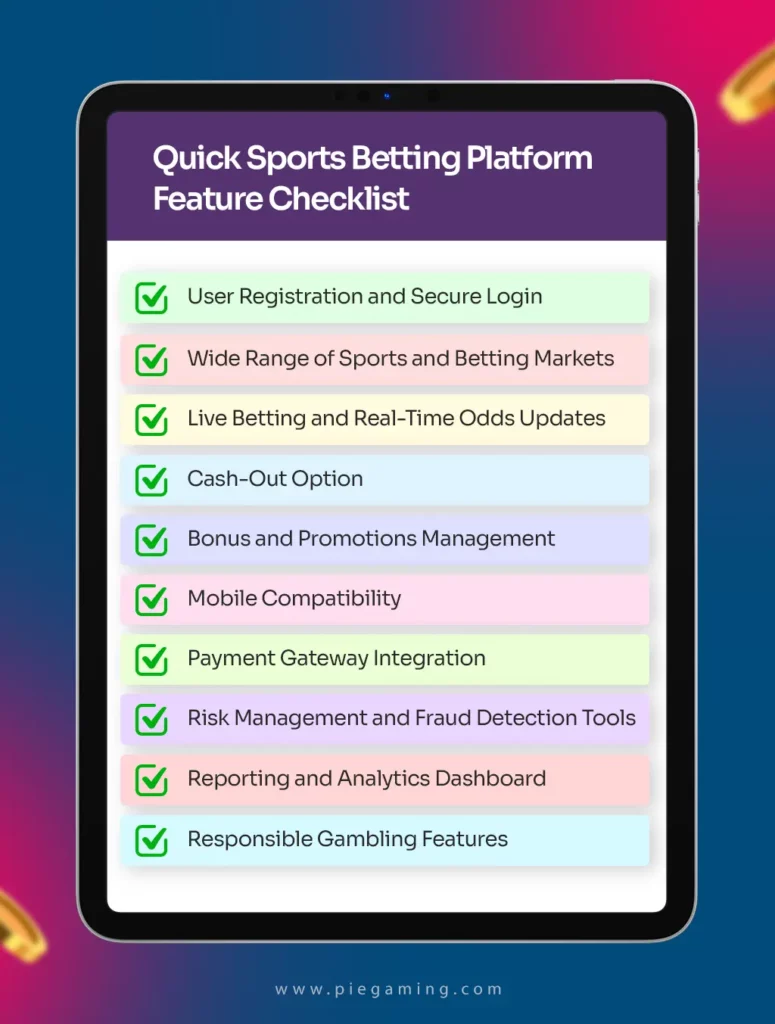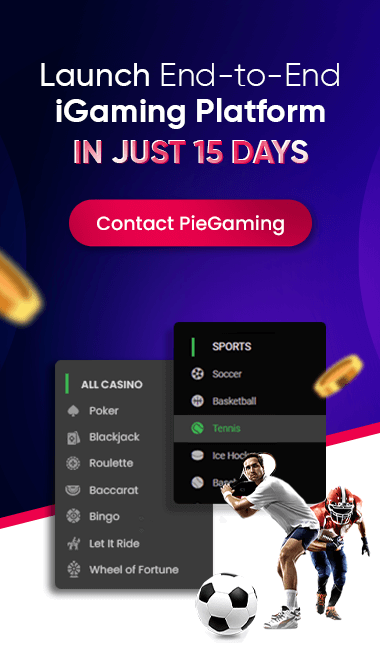Your Online Sports Betting Sites Checklist: Top Features for 2026
- Author:Palak Madan
- Read Time:7 min
- Published:
- Last Update:February 19th, 2026
Launching or running a sportsbook? This Online Sports Betting Sites Checklist reveals key features and compliance steps that you don’t want to miss.

This checklist covers everything your online sportsbook needs to succeed. From licensing and payment methods to odds providers and security. Use it to avoid costly oversights and stay ahead of your competition.
Betting operators who consistently outperform the sports betting market focus on getting all the details right.
Each element on an online sports betting checklist shows a competitive advantage that your rivals hope you overlook.
Before your next planning session, study what successful platforms do differently.
Why a Solid Checklist Matters in the Sports Betting Industry?
For operators, a good online sports betting checklist is a strong tool, not just a to-do list.
The sports betting market changes fast with new rules, tech, and what players want.
Without checking your platform regularly, problems go unnoticed until they hurt your profits.
A checklist helps find weak spots before players leave for competitors. It makes teams responsible and turns big goals into clear action steps.
Most low deposit betting sites are strong in some areas but weak in others. A proper Online Sports Betting Sites Checklist shows these gaps, so you can use your money and time better.
In betting, small details greatly affect whether players stay and spend more.
Regular checks stop costly mistakes that competitors might use against you.
Smart operators use checklists not to just maintain standards but to keep improving. This gives you an edge in a tough market.
The Ultimate Sports Betting Site Checklist

Quick Sports Betting Platform Feature Checklist
Creating a winning sports betting platform doesn’t happen by chance. Follow this online sports betting checklist to build a site that converts.
1. Clear Revenue Strategy from Day One
Create your monetization approach before launching.
Define your target profit margins, commission structures, and how you balance different betting markets.
Know exactly how much volume you need to break even, and which product will drive your bottom line.
A solid revenue strategy prevents costly pivots, which is a key point in any Online Sports Betting Sites Checklist.
2. Defined Player Profiles and Market Fit
Identify who your ideal bettors are and tailor your platform to their needs.
Are you targeting casual weekend bettors, serious sports analysis, or in-play enthusiasts?
Each segment has different expectations for odds in sports betting, markets, and user experiences.
Build for specific users rather than trying to please everyone — a golden rule on any Online Sports Betting Sites Checklist.
3. Sustainable Bonus & Promotion Logic
Design different types of sportsbook bonuses and promotions that attract quality players without draining your resources.
Calculate the true cost of acquisition for each promotion type and set clear terms to protect against bonus abuse.
The most successful operators create offers that encourage genuine betting activity rather than bonus hunting.
4. Traffic Sources & Cost Forecasts
Map out exactly where your players will come from and what it will cost to acquire them.
Whether through paid advertising, SEO, or partnerships, understand the economics of each channel.
Create detailed projections for customer acquisition costs and set realistic conversion rate expectations for each traffic source.
5. Affiliate Partner Readiness
Start an iGaming affiliate program before launching with clear commission structures, tracking systems, and marketing materials.
Top affiliates look for reliable payments, quality reporting, and responsive partnerships with managers.
Make it easy for partners to promote your platform with custom landing pages and compelling creative assets.
6. Local Market Edge
Identify what makes your offerings attractive in your target market.
This could be specialized in local sports coverage, regional payment methods, or cultural connections through sponsorships.
Operators who understand local betting preferences consistently outperform generic international platforms.
Read More – Top iGaming Payment Solutions Providers
7. Risk Management Plan
Develop systems to identify and mitigate financial exposure from sharp bettors and potential fraud.
Implement iGaming risk management for suspicious betting patterns and set appropriate betting limits across different markets.
8. Retention Strategy Beyond the First Deposit
Map the full customer journey with specific engagement tactics for day 7, 30, 60 and beyond.
Create personalized reactivation campaigns based on betting history and preferences.
The profitable betting operations focus on player lifetime value, not just acquisition numbers.
9. Margin Optimization Without Killing User Experience
Find the soft spot between profitable margins and competitive odds that keep players engaged.
Test different margin levels across various sports and betting types to identify price sensitivity.
Consider vast margin structures that reward loyal players while maintaining overall profitability.
10. Scalable Operations & Support
Build your platform with growth in mind from day one.
Ensure your technical infrastructure can handle peak betting periods without performance issues. Here’s how:
- Create a customer support team that maintains quality as volume increases.
- Clear escalation paths, and resolution standards that keep players satisfied.
Common Mistakes that Several Online Sports Betting Software Operators Make
Don’t let these preventable mistakes derail your sports betting operations. Here’s what experienced operators wish they’d known from the start.
1. Launching Without a Clear Business Model
Many operators rush to launch without knowing how they’ll make money. They haven’t figured out their margins, what it costs to get bettors or when they’ll break even.
This leads to constant strategy changes that confuse everyone.
Smart operators map out exactly how they’ll profit before taking their first bet and set clear goals to track success.
2. Overinvesting in Features, Underinvesting in Acquisition
Too many betting sites spend big on fancy feature players rarely use while cutting corners on marketing.
This builds impressive but unused betting options while nobody finds the platform.
The best operators perfect the basics first, then spend heavily on getting actual players through the door who can use these features.
3. Assuming ‘If You Build It, They Will Come’
Many operators think a good platform will attract bettors on their own.
They launch with minimal marketing, hoping words will spread naturally.
But here’s the reality check: the betting market is packed with options, and nobody will find you without effort.
Successful sites launch with strong marketing plans across multiple channels. This creates a buzz before they even go live.
4. Ignoring Regional Nuances
Operators often use the same platform in every market without local customizations.
They miss important differences in preferred sports, payment methods, and betting style.
This cookie-cutter approach turns off local players seeking familiar experiences.
Winning operators study each market carefully. They adapt everything from odd formats to support hours to match local needs.
5. Mismanaging Bonus Structures
Many sites offer overly generous bonuses without checking if they’ll make money long-term or prevent abuse.
They attract bonus hunters instead of long players, bleeding money with each promotion.
Smart operators design offers based on player value analysis. This ensures bonuses create profitable activities rather than just signups.
Their terms reward real betting rather than minimum play.
6. No Long-Term Retention Plan
Operators often focus only on getting new players with no plan for keeping them after welcome bonuses expire.
They keep buying expensive players to replace the ones who left.
Successful platforms create systematic retention programs with personal offers, loyalty rewards, and comeback campaigns. It keeps players interested through different spirts seasons.
7. Poor Affiliate Onboarding and Management
Many operators neglect their affiliates, providing weak marketing materials, confusing commissions, or late payments.
They treat these partners as afterthoughts.
Leading operators invest in user-friendly affiliate dashboards, responsive managers, and reliable payment systems.
They create special deals for top performers and share detailed data that builds relationships.
8. Weak Risk Management
New operators often fail to set up proper systems to spot professional bettors, fraud, or unusual betting patterns.
They either limit betting too strictly (annoying casual players) or too loosely (risking big losses).
Successful operators use smart tools that flag suspicious activity while letting regular players enjoy betting without unnecessary restrictions.
9. Underestimating Compliance Costs and Delays
Many operators don’t budget enough for licenses, legal help, and ongoing compliance work.
They are surprised by how much time and money it takes to meet regulations in each market.
- Smart operators talk to regulation experts early.
- Build compliance into their plan from day one.
- Keep dedicated staff to handle the constant changes in betting laws.
10. Poor UX on Mobile
Despite most betting happening on the phones, many platforms still design computers first and treat mobile phones as secondary.
Their apps crash during big games, have clumsy bet slips, or give account management a headache.
Top operators put mobile first with smooth betting, fast loading times, and simple navigation that prevent players from giving up mid-bet.
Read More – How to Secure a Gaming License?
Wrapping Up…
The race to build a winning sports betting platform isn’t won by those with the longest feature list. But those who understand what bettors truly love.
Your platform should feel like a trusted friend who knows the game and makes betting simple and fun.
The platforms that thrive don’t just facilitate transactions; they create memorable experiences that keep aplayers coming back when competition is just a click away.
FAQs
-
How to create a betting site?
Team up with good software companies, get proper licenses, build easy-to-use screens, and add safe payment options. Focus on making bettors happy while following all the rules.
-
What should I look for in a sports betting site's bonus system?
Create bonuses players can actually earn, with simple terms and real value. Balance what you spend to get new customers against keeping them coming back.
-
Why are secure payment gateways important for sports betting sites?
Safe payments build trust, protect financial details, and follow regulations. They reduce dispute charges, speed up money transfers, and keep bettors loyal.
-
Is online sports betting legal and regulated?
Laws differ in each region, with specific licenses needed in regulated markets. Know your target areas well, work with experts, and use strong age checks.

Palak Madan is a enthusiastic writer at PieGaming. With over 2+years of experience crafting engaging content and a strong literature background, Palak brings a unique perspective to the world of words. Her ability to blend creativity with strategic thinking has made her a sought-after content creator. She's eager to dive deep into the intricacies of iGaming software, uncovering the stories behind the technology and translating complex features into compelling narratives.
-
 Piegaming Admin February 26, 2026
Piegaming Admin February 26, 2026This blog walks you through the top eSports games, most played and watched by the audience. Stay tuned to find out about the best eSports betting games available worldwide.
-
 Palak Madan February 13, 2026
Palak Madan February 13, 2026Learn what virtual sports betting is, how it works, and why it’s growing fast in iGaming. A clear, practical guide for operators and betting platforms.
-
 Palak Madan September 29, 2025
Palak Madan September 29, 2025Discover the latest online casino and sports betting regulations in Algeria. Learn how the laws impact operators, players, and the future of iGaming in the region.
-
 Monika Gola August 5, 2025
Monika Gola August 5, 2025Armenia offers golden opportunities to iGaming operators. Here, get a quick insight into online casino and sports betting regulations in Armenia.
-
 Palak Madan June 20, 2025
Palak Madan June 20, 2025Canada’s 2025 iGaming laws vary by province. This guide breaks down what’s legal, what’s changing, and where online casinos and sports betting stand…
-
 Monika Gola June 19, 2025
Monika Gola June 19, 2025Mexico is actively developing as a promising iGaming market. It’s a golden opportunity for operators to learn about online casino and sports betting…
-
 Monika Gola June 5, 2025
Monika Gola June 5, 2025Planning to launch your iGaming business in Malta? This free guide covers sports betting and online casino regulations in Malta to help you…
-
 Palak Madan April 29, 2025
Palak Madan April 29, 2025This guide lists the top 10 sports betting odds providers in 2026, helping operators choose fast, accurate, and reliable data sources for their platforms.
-
 Monika Gola April 28, 2025
Monika Gola April 28, 2025Spain has witnessed remarkable growth in the iGaming industry globally. This blog discusses online casino and sports betting regulations Spain. Stride along till the end.
-
 Palak Madan April 23, 2025
Palak Madan April 23, 2025The UK’s online sports betting and casino regulations in 2025 focus on permits, following rules, and keeping players safe. Companies must follow new…
-
 Monika Gola April 10, 2025
Monika Gola April 10, 2025Sports betting has been in the roots of South Africa. It’s an opportunity for operators to run an iGaming business and rake in…
-
 Palak Madan February 26, 2025
Palak Madan February 26, 2025Sports betting software development involves creating custom platforms. These platforms help manage bets, process payments securely, and provide live betting options. They also…
-
 Palak Madan November 20, 2024
Palak Madan November 20, 2024Starting a sports betting business in the UK involves ensuring compliance, obtaining licenses, selecting software, setting up payment systems, and much more. Let’s…
-
 Monika Gola August 9, 2024
Monika Gola August 9, 2024A trusted sportsbook platform handles odds, risks, and real-time betting. This guide highlights the top sportsbook software providers to trust. Launching or scaling…
-
 Nikita Ajmani July 11, 2024
Nikita Ajmani July 11, 2024Sports Betting in the iGaming Industry: A market finally getting its dues! Existing for over a century in various parts of the world,…
-
 Simranjeet Kaur July 5, 2024
Simranjeet Kaur July 5, 2024In the high-stakes sports betting world, fortunes can be made or lost as a result of a single match outcome. But what if…
-
 Palak Madan May 28, 2024
Palak Madan May 28, 2024This blog explores the world of sports betting, covering new sports betting trends like mobile apps and AI, key challenges, and future growth…
-
 Simranjeet Kaur May 14, 2024
Simranjeet Kaur May 14, 2024Let’s understand sports betting and odds in sports betting, how they are calculated, and how as a beginner, you can read them.
-
 Palak Madan April 4, 2024
Palak Madan April 4, 2024Explore the future of online sports betting in 2025 and learn how innovation, data, and evolving regulations are shaping growth and global market opportunities.
-
 Palak Madan February 8, 2024
Palak Madan February 8, 2024Discover everything you need to know about white label betting exchange solutions in 2025. Learn how they work, and how to launch your own platform.
-
 Palak Madan February 1, 2024
Palak Madan February 1, 2024See how white label sportsbook solutions make online sports betting better. Explore custom features, quick setup, and benefits for operators in 2025.
-
 Monika Gola January 31, 2024
Monika Gola January 31, 2024Discover the top 6 tips for selecting reliable turnkey betting platform providers to enhance the betting experience for your customers. Click to read now.
-
 Palak Madan January 16, 2024
Palak Madan January 16, 2024Here’s the list of the leading 5 whitelabel sports betting exchange providers worth exploring. Note their exceptional services & offerings setting them apart.
-
 Palak Madan December 30, 2023
Palak Madan December 30, 2023Want to launch your own sportsbook? Learn how to create your own sports betting platform from scratch — from licensing to compliance. Start smart in 2026.
-
 Monika Gola December 6, 2023
Monika Gola December 6, 2023The growing popularity of sports betting is opening doors for operators. Read here the history, present and future of the global sports betting…
Voila!
See you in your inbox soon!

Stay ahead of the game. Subscribe for exclusive content, updates, and insiders!
We use cookies to enhance and personalize your browsing experience. By continuing to use our website, you agree to our Privacy Policy.




